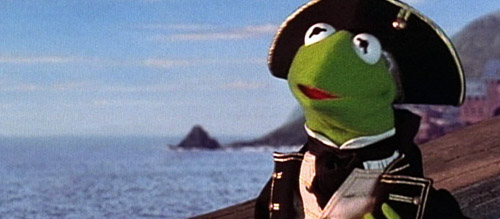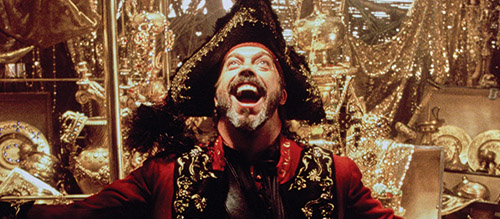Muppet Treasure Island (1996) – 25th Anniversary Review
Muppet Treasure Island (1996)
Director: Brian Henson
Screenplay: Jerry Juhl, Kirk R. Thatcher, James V. Hart
Starring: Tim Curry, Billy Connolly, Jennifer Saunders, Kevin Bishop, Dave Goelz, Steve Whitmire, Jerry Nelson, Kevin Clash, Bill Barretta, Frank Oz
For all those involved in the creation of what is The Muppets’ fifth theatrical release, surely only in their wildest dreams could they have envisaged that in 25 years time, their song “Cabin Fever” would be the unofficial anthem of the whole world. The fact that this song comes to mind to those down in the doldrums of prolonged indoor living, decades after its initial release, is a testament to the ongoing popularity of Muppet Treasure Island, and confirms that it can give all of its rivals a run for their money for title of Most Beloved Muppet Film.
After the huge success of The Muppet Christmas Carol with Disney, it made perfect sense for director Brian Henson to do another period piece. After a toss up with King Arthur, it was Robert Louis Stevenson’s novel “Treasure Island” that was gifted with the most outlandish film adaption in cinematic history. The story follows Jim Hawkins (Kevin Bishop), an orphan who works in the Benbow inn alongside his friends, Gonzo the Great and Rizzo the Rat, where they are often regaled by their regular, Captain Billy Bones (Billy Connolly) and his stories of the villainous Pirate, Captain Flint, and his buried treasure. These stories quickly turn into reality when Blind Pew, one of Billy’s old shipmates, arrives at the inn to give Billy Bones “The Black Spot”- a pirate’s death sentence. It turns out Billy Bones had Captain Flint’s treasure map in his possession the whole time, but whilst trying to escape from his old murderous shipmates he suddenly dies, passing down the map to Jim, who seizes the opportunity to follow in his late father’s footsteps and go on a sea adventure. He pitches the treasure quest to the dim-witted Squire Trelawney (Fozzie Bear) who agrees to finance the voyage, which he leaves the enigmatic Long John Silver (Tim Curry), a one-legged ship’s cook, to organise. However, Billy Bones’ dying warning (“Beware the one-legged man”) goes amiss, and no sooner than they have weighed anchor does it become obvious that the voyage has been sabotaged by pirates. Jim and Captain Smollett (Kermit the Frog), must then race against the pirates to find the treasure and escape Treasure Island alive.
Each Muppet theatrical release always had something new to bring to the table, either in terms of storytelling or technical innovation. The Muppet Movie (1979) was obviously a game-changer, accomplishing many puppetry feats such as Kermit riding a bike and Fozzie driving a car; The Great Muppet Caper (1981) had the muppets in high octane action sequences including Miss Piggy’s iconic motorbike chase; The Muppets Take Manhattan (1984) had Kermit and Miss Piggy finally tying the knot; and of course The Muppet Christmas Carol (1992) became one of the greatest film adaptions of all time, with its emotionally poignant yet silly retelling of the great Dickens tale. So what did Muppet Treasure Island have to bring to the table?
The movie doesn’t really cover any fresh ground, and although it had a much bigger budget than other Muppet films, it lacked some of the production value of its immediate predecessor (the recreation of Victorian London in the winter really was breath-taking). There is no major break through in the Muppet puppetry, and in terms of story it isn’t particularly original – not being the first Muppet period piece or the first “Treasure Island” film adaption – but Muppet Treasure Island does take all of the best elements of the previous Muppet film releases (and productions in general) and balances them perfectly in one of the most universally appealing family films of all time. For those who grew up on the works of Jim Henson, Muppet Treasure Island is the last of the truly great Muppet films, with all of its successors not quite managing to hit the ultimate sweet spot that fans have craved ever since.
The secret to Muppet Treasure Island‘s ability to enthral adults and children alike is its superb writing and direction. Both Brian Henson and Jerry Juhl are Muppet veterans, with Juhl providing writing since ‘The Muppet Show’ and Henson being enlisted in the family business since The Muppet Movie. And, judging by the huge box office and critical success of The Muppet Christmas Carol, both know how to do source material justice.
Robert Louis Stevenson’s original book is actually packed with murder and death, which if completely faithfully translated to film would prove to be a frightening watch for very young audiences, but the darker moments of Muppet Treasure Island are quickly balanced-out with comedy, breaking any tension. This isn’t just a benefit for any kids watching, Juhl’s comedy prowess is smart enough or at least absurd enough to leave most adults in hysterics. One such notable moment (of which there are many within the 99-minute runtime) is when Long John Silver fires his pistols to defend himself from his angry mob of pirates: one pirate is left grieving after one of his shipmates is apparently fatally wounded by Silver’s gunfire, to then be gently reminded:
” But Dead Tom’s always been dead – that’s why he’s called Dead Tom!”
Muppet Treasure Island is full of these brief, humorous sketches to keep the story light-hearted, making this Muppet film most akin to ‘The Muppet Show’, which was on the same level as ‘Monty Python’s Flying Circus’ in terms of breakneck surrealist comedy. These brief diversions from the action of the main storyline, such as the ongoing sub-plot of Brooklyn city rats using the voyage of the Hispaniola as a cruise, help to maintain the youngest of audience members’ attention. Whenever there is exposition, a joke is not too far away.
It would be a lie to say that, with this constant onslaught of gags, Muppet Treasure Island doesn’t come across as annoying just as many other children’s films do, with some reliance on long-drawn, unnecessary squealing and noise from the more silly Muppet characters. However, it has the edge over most contemporary family films as so much of its comedy doesn’t spawn from lazy pop culture references. Furthermore, despite it rivalling the laughter rates of comedy juggernauts like Airplane! (1980), the humour of Muppet Treasure Island doesn’t actually detract from the story itself. The straight men of the Muppets entourage such as Kermit and Sam Eagle are brought out for moments of peril, but most of the emotional poignancy is achieved by the human characters, namely Jim Hawkins and Long John Silver.
The balance and interaction between the Muppets and their human co-stars is one of the most important factors for a successful Muppet flick: in its predecessor, The Muppet Christmas Carol, Michael Caine (as Ebenezer Scrooge) was the focal point of the film’s plot, which hadn’t been done before by the Muppets. It’s a major reason that The Muppet Christmas Carol is one of the most popular Christmas movies of all time, achieving an impressive depth and seriousness that does Dickens’ philanthropic message justice. In Muppet Treasure Island, the plot centres around Jim Hawkins, played by child actor Kevin Bishop. Bishop’s lack of experience, having only previously appeared in children’s TV series ‘Grange Hill’, meant he struggled to carry the plot single-handedly, ultimately leaving much of the film’s emotional weight to screen and stage legend Tim Curry in his role as Long John Silver.
It is curious to note that whilst Michael Caine played the part of Ebenezer Scrooge as straight as he would in a Royal Shakespeare Company production, Tim Curry totally hams it up – the man is practically one of the Muppets. Still, even with this larger than life screen presence, he manages to navigate quieter moments with his human co-star, creating a very believable relationship between Hawkins and Silver, making Silver’s treachery all the more shocking and hurtful. Muppet productions, despite their reputation for wackiness, have always had substance, with each of their movies having a moral to their story, and as such Tim Curry’s Silver is a dangerous figure who helps to build the thrilling adventure story at the heart of this film, his flamboyance and camp touches making him the kind of villain who is impossible to not love, a key component of what makes Muppet Treasure Island so memorable and fun. Backed up by the experience gained from the four earlier Muppet movies, Juhl and Henson, along with Curry, knew how to nail the serious drama of “Treasure Island”, and it’s in getting this story right that the film production was able to give The Muppets a free pass to go absolutely nuts.
It truly is the craziness of Muppet Treasure Island that has made it so memorable for the 25 years since its release – there isn’t really a comparison to any other family film that can rival its unrestrained madcap comedy, capable of orchestrating a continuous stream of belly laughs from its audience. The fact that most of the human co-stars were unable to resist joining in with the hilarious Muppet antics is simply delightful.
The best demonstration of Muppet Treasure Island‘s ability to offer cheer is its musical legacy. One of the most underappreciated elements of all Muppet productions is their wealth of original songs, with these films being the most over-looked entries of musical cinema. Not only does the film boast a pre-Pirates of the Caribbean score from Hans Zimmer, but it has some of the most popular songs of the Muppets’ discography – it is very clear that all the stops are pulled out for this film’s musical numbers.
“Upstage Lads! This is my only Number!”
Much of the adoration garnered by Muppet Treasure Island is due to these musical numbers. All are relevant and integral to the plot, and they each help to create the joyful and adventurous mood of the film. They are essential to keeping true to the adventurous spirit of the original novel, being a vehicle for the best moments of Muppet comedy, and for illustrating the warmth and joy of this production. In The Muppet Movie, Kermit expresses his wish to be able to make millions of people happy, and this ambition more than comes true with Muppet Treasure Island, one of the smartest family comedies of the 90s and beyond.
For those who first saw the film released in 1996, we have never forgotten it, but the secret to its ongoing popularity even 25 years on is because it doesn’t disappoint. It never falls short of the expectations of those who return to the film as adults after first seeing it as children. Muppet Treasure Island is just as hilarious and as fun as we all remembered it back in the day, and while there are moments in which it can go over the top, and while it doesn’t necessarily offer anything new to long-standing fans, Muppet Treasure Island has set the bar for where we hope Muppet Productions in the future will eventually reach again.
17/24
Recommended for you: The Muppets Movies Ranked




